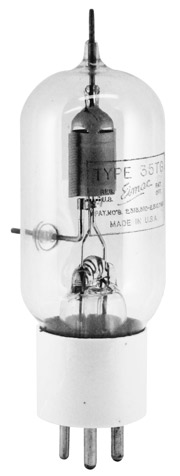My grandfather, who started this sequence of people, has a presence on the web, which I think would have tickled him, since he was deeply into electronics and technology from the early part of the 20th century (he died a year before ARPANet was born). In 1962 he was Hamvention® Amateur of the Year.
His call letters were W8UPB, which he liked to say as "Whiskey 8 Uncle Peter Baker". I have fond memories of sitting in his big oak swivel chair, in his radio "shack" (which was actually in his attic), surrounded by tall racks filled with his hand-built receiver and transmitter (electronics were big in the mid-50's).

And I would lean into the microphone, press the transmitter key, and say "Hello, CQ, CQ, this is Whiskey 8 Uncle Peter Baker, Cincinnati, Ohio, calling CQ, CQ. Standing by and listening on and about the frequency," as the blue lights pulsed.
And then I'd release the key, the blue glow would fade, and answering voices would crackle out of the big paper-cone loudspeaker mounted in a sheet-metal box that rattled. And we would talk, those strangers and I, not about anything much, mostly just impressed that things were working, and reveling in the technology, as men (and boys) still do to this day.
Off to the right, as I sat in his chair, was a big metal box, a few feet square, from which sprouted an alien skyline, of glass vacuum tubes, metal boxes, transformer coils, capacitors, and bits of wire. Above it all floated a big round glass picture tube, black and white of course, and all of 12" in diameter on the picture end. In short, an early television set.
It required constant fiddling to keep it going, and it tended to drift off channel as it warmed up, so for easy access to the circuits my grandfather never kept it in its nice furniture box; it was just the picture tube and supporting circuits, sitting on a table. It ran once a week, just so he could watch Lawrence Welk. My grandmother didn't approve, which is why it sat in the attic, aimed at the big oak swivel chair in the radio shack.
My grandfather was a smallish man, with a classically grandfathery face, rimless glasses, eyes squinted up from the smoke of the cigarette which always dangled from the corner of his mouth. He would sit beside me, adjusting the many knobs on the equipment, watching the meters. When he leaned down, he tilted his head to one side and awkwardly back, so the smoke wouldn't get in his eyes. He taught me a great deal about electronics, although I never shared his passion for radio.
We didn't know it at the time, but my life would not be spent with those big bulky electronic components you needed two hands to hold. The invention of the transistor, two years before I was born, would quickly obsolete my grandfather's self-taught skills in electrical engineering, and would provide for me an all-absorbing toy called the computer.
And yet, we share a bond that transcends such technical details–a bond of electrons and the technologies that manipulate them. How curious that an invisible and inherently unknowable, yet useable, gift of Mother Nature should so fascinate us both, giving us each enjoyment as well as a living.
- October, 2006 -
- Dana Cartwright, Syracuse, NY